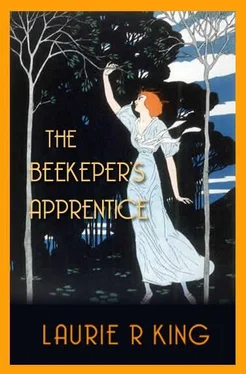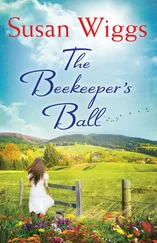Laurie King - The Beekeeper's Apprentice
Здесь есть возможность читать онлайн «Laurie King - The Beekeeper's Apprentice» весь текст электронной книги совершенно бесплатно (целиком полную версию без сокращений). В некоторых случаях можно слушать аудио, скачать через торрент в формате fb2 и присутствует краткое содержание. Жанр: Триллер, Классический детектив, на английском языке. Описание произведения, (предисловие) а так же отзывы посетителей доступны на портале библиотеки ЛибКат.
- Название:The Beekeeper's Apprentice
- Автор:
- Жанр:
- Год:неизвестен
- ISBN:нет данных
- Рейтинг книги:5 / 5. Голосов: 1
-
Избранное:Добавить в избранное
- Отзывы:
-
Ваша оценка:
- 100
- 1
- 2
- 3
- 4
- 5
The Beekeeper's Apprentice: краткое содержание, описание и аннотация
Предлагаем к чтению аннотацию, описание, краткое содержание или предисловие (зависит от того, что написал сам автор книги «The Beekeeper's Apprentice»). Если вы не нашли необходимую информацию о книге — напишите в комментариях, мы постараемся отыскать её.
The Beekeeper's Apprentice — читать онлайн бесплатно полную книгу (весь текст) целиком
Ниже представлен текст книги, разбитый по страницам. Система сохранения места последней прочитанной страницы, позволяет с удобством читать онлайн бесплатно книгу «The Beekeeper's Apprentice», без необходимости каждый раз заново искать на чём Вы остановились. Поставьте закладку, и сможете в любой момент перейти на страницу, на которой закончили чтение.
Интервал:
Закладка:
"Excellent. Now, Miss Russell, do you see the envelope on the shelf to your right? The top one. Stand up and get it please — slowly now, remember. All right, take it back to the table and place it in front of Sherlock. Sit down, hands on top of the table. Good.
"This document is your suicide note, Sherlock. Rather lengthy, but that cannot be helped. If you are curious, the machine it was typed on is downstairs, substituted for your own. Read it, by all means, and lay it in front of Miss Russell if you wish her to see it. You will not touch it, Miss Russell. One never knows how clever the fingerprint people have become, and it would not do to have your fingerprints on such a highly personal document as this. Please, dear Sherlock, you must read it. I am really quite pleased with the effect it produces, if I do say so myself. Besides that, you must never sign any document until you've read it." She laughed merrily, and the madness rang clearly from her.
It was, as she said, a suicide letter. It began by stating that he, Sherlock Holmes, being in his right mind, could simply no longer see any point in staying alive, and it went on to elaborate the reasons. My rejection of him and the ensuing depression it caused were so vehemently denied as to underline my absence as the chief cause of his decision, though I personally was carefully removed from blame.
Then the letter launched into a long, rambling, detailed explanation of how the cases as recorded by Dr. Watson had been so entirely wrong. Seventeen cases in all were presented with microscopic attention, pointing out in each one where the credit for its solution had in reality lain: usually with the police, occasionally elsewhere, several times by Holmes accidentally stumbling on the answer, once with Watson. Page after page of it, we read and she sat. Finally came the murder of Moriarty, where it was revealed that the entire story was a deliberate fabrication against an inoffensive professor who had stolen the young woman Holmes desired, and whom Holmes had then hounded to his death by the creation of a totally imaginary crime syndicate. The document ended with an abject apology to the memory of a great man so badly wronged, and to the population in general who had been so misled.
It was an extremely effective piece of writing. The reader was left with the clear impression of a badly unbalanced, severely depressed, drug-ridden egotist who had destroyed careers and lives in order to build his reputation.
The simple white sheets with their lines of print, were they ever to get before the public, would create a huge scandal, and very possibly turn the name of Sherlock Holmes into a laughingstock and the object of scorn. I sat back, shaken. "You have a definite flair for fiction-writing," said Holmes, his voice cold with revulsion, "but surely you cannot believe I might sign the thing."
"If you do not, I shall shoot Miss Russell, then I shall shoot you, and one of my employees will forge your signature to it. It will appear to be a murder-suicide and will take Miss Russell's name down with yours."
"And if I do sign it?"
"If you do sign it, I shall allow you to give yourself one final injection, one that will prove fatal even for a man of your inclinations. Miss Russell will be taken away and released after the newspapers have found your letter.
She has no proof, you see, none at all, and I shall be far away."
"You would give me your word that no harm should come to Miss Russell?"
He was quite serious, even I could see that.
"Holmes, no!" I cried, appalled.
"You will give me your word?" he repeated.
"You have my word: No harm will come to Miss Russell while she is in my care."
"No, for God's sake, Holmes." My attempt at lying invisibly in wait was shattered. "Why on earth would you believe her? She'd shoot me as soon as you were gone."
"Miss Russell," she protested, affronted, "my word is my honour. I paid Mr. Dickson his fee posthumously, did I not? And I support that other worthless family while my employee is in prison. I even sent that messenger lad who delivered the clothing his second sovereign. My word is good, Miss Russell."
"I believe you, Patricia. Why, I don't know, but I do. I am going to take my pen from my inner pocket," he said and, with slow and deliberate movements, did so. I watched in horror as he uncapped it, turned to the last page of the sheaf of papers, and put the pen to the paper.
Anticlimactically, the thing refused to write. He shook it, without success, and looked up.
"I'm afraid the pen is dry, Patricia. There is a bottle of ink in the cupboard above the sink."
There was a moment's hesitation as she looked for a trick, but he sat patiently with the pen in his hand.
"Miss Russell, you get the ink."
"Holmes, I — "
"Now! Stop snivelling, child, and get the ink, or I shall be tempted to put another hole in you."
I stared at Holmes, who looked back at me calmly, one eyebrow raised slightly.
"The ink, please, Russell. Your tutrix appears to have us in a position of checkmate."
I pushed my chair back abruptly to hide my surge of hope and went to fetch the bottle. I put it on the table in front of Holmes and took my seat. He pushed the paper away, unscrewed the top of the squat ink bottle, drew the ink up into his pen, and cleared the nib of excess ink by pulling it, first one side and then the other, against the glass rim of the bottle. He then laid the pen on the table, screwed down the lid, put the bottle to one side, picked up the pen again, pulled the final sheet of typescript back in front of him, held the pen over the paper, and paused.
"You know, of course, that your father also committed suicide?"
"What!"
"Suicide," he repeated. He capped the pen absently and laid it on the table in front of him, picked up the ink bottle and fiddled with it for a moment, deep in thought, laid it aside, and leant forward on his elbows.
"Oh, yes, his death was suicide. He followed me to Switzerland after I destroyed his organisation, arranged a meeting at the most solitary spot he could find, and came to meet me. He knew he was no match for me physically, yet he did not bring a gun. Odd, don't you think? Furthermore, he arranged for a confederate to fling rocks at me afterwards, because he suspected that he would not take me with him into death. No, it was suicide, Patricia, quite clearly suicide." In the course of this speech his voice had grown harder, colder, and his lips curled over her name as if he were pronouncing an obscenity. The relentless cadence of his words went on, and on.
"You say you have come to know me, Patricia Donleavy." He spat out her name and wrapped it in scorn, facing her across the table. "I know you too, Madam. I know you for your father's daughter. Your father had a superb mind, as do you, and as you did he left the world of honest thought and turned to the creation of filth and evil. Your father created a network of horror and depravity that exceeded anything these islands had ever before known, a web woven of all that the world of crime has to offer. His agents, 'employees' as you call them, robbed and murdered, drained families through blackmail, and poisoned men and women with drugs. Nothing was too squalid for your father, Patricia Donleavy, from smuggling and opium to torture and prostitution. And all the time — ah, the perverted, filthy genius of it! — all the time the good professor sat in his book-lined study and kept his delicate hands clean of it. Nothing touched him, not the agony or the blood or the stink of terror that spread out from his agents. Just like you, Madam, he was touched only by the profits of all that sordid purulence, and he bought his wife pretty dresses and played mathematical games with his little daughter in the drawing room. Until I came along. I, Sherlock Holmes, with my meddlesome ways. I carved the network into many small pieces and I turned the name Moriarty into a term of derision, so that even his daughter will not carry it openly, and finally, when there was nothing left of his life, when I had driven him into a corner from which he could not escape, I pushed him over the Reichenbach Falls and he died. Your father, Patricia Donleavy, was a festering sore eating into the face of London, and I, Sher — "
Читать дальшеИнтервал:
Закладка:
Похожие книги на «The Beekeeper's Apprentice»
Представляем Вашему вниманию похожие книги на «The Beekeeper's Apprentice» списком для выбора. Мы отобрали схожую по названию и смыслу литературу в надежде предоставить читателям больше вариантов отыскать новые, интересные, ещё непрочитанные произведения.
Обсуждение, отзывы о книге «The Beekeeper's Apprentice» и просто собственные мнения читателей. Оставьте ваши комментарии, напишите, что Вы думаете о произведении, его смысле или главных героях. Укажите что конкретно понравилось, а что нет, и почему Вы так считаете.












